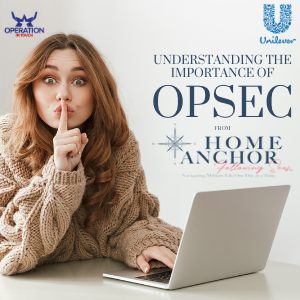
Why Every Military Family Needs to Know the Importance of OPSEC!
By Elizebeth Gilliland
The first time I heard the acronym OPSEC, I had just joined my first military spouse’s group. Not wanting to look like a freshly minted spouse I didn’t ask what this OPSEC was all about. However, as time went on I learned as a military spouse I should always be aware of my surroundings and who may be listening to conversations.
In one such instance, a few friends in my military spouse tribe and I decide we need a much overdue night out. Our husbands are gone on deployment protecting our freedom somewhere in the big blue ocean.
As we all know deployments can make life a little crazy with having to do it all when our husbands are gone. Sometimes it’s good to just get out and leave the dishes in the sink for later. You know they’re not going to do themselves so they’ll be there when you get home anyway. And that’s ok!
So we make our way down to the strand to one of the great restaurants for dinner. We talk, laugh and are having a great time.
The conversation was light at first, but eventually one of the wives began talking about what she had planned for her husband’s return. But the comments about the dates of their return made me nervous.
Especially since we were out in public where anyone could hear.
So, I want all my fellow military wives to understand what is at stake and exactly…
WHAT IS OPSEC?
Another acronym? Yes, it’s our way of life, but this one is probably one of the more important ones you need to know and understand.
OPSEC stands for Operations Security.
But what does that really mean?
Well, the official DoD definition is: OPSEC is a systematic and proven process by which the U.S. Government and its supporting contractors can deny to potential adversaries information about capabilities and intentions by identifying, controlling, and protecting generally unclassified evidence of the planning and execution of sensitive Government activities. (National Security Decision Directive 298)
Woah! That’s intense!
Did you get any of that? Because I know I am a little overwhelmed with that definition!
A DEFINITION YOU CAN UNDERSTAND
You can find free WiFi just about anywhere. Not to mention you never know who may be listening to your conversations either through the cyber world or in person. This alone makes OPSEC one of the most important things you’ll ever do in keeping your service member and your family safe.
So let’s break it down and put it in terms that you can understand. As well as what you need to do to stay in OPSEC good graces.
OPSEC is NOT a set of rules that tell you what to say or not say. Rather it is a process, a method for denying adversaries access to critical information.
You want to make sure you are not providing our adversaries information which could do harm to our service members and military operations. So, in essence, it’s a mindset you need to practice all the time and anywhere you are.
But I’m not in the military! Why do I have to pay attention to OPSEC?
You are a partner, as a military spouse, in helping keep our troops safe and out of harm’s way. Remember adversaries frequently visit some of the same stores, clubs, recreational areas, places of worship, restaurants and of course social networking sites as you do.
Also, keep in mind that following OPSEC is also good for your personal security (PERSEC) and that of your family because an adversary isn’t always a terrorist. They could be thieves waiting for you to reveal when your house will be unoccupied or cyber-criminals wanting your information to steal your ID. Maintaining situational awareness is staying safe as an individual and watching out for loved ones.
PUZZLE PIECES AND CRITICAL INFORMATION
Critical Information is any information an adversary can use to keep our military from accomplishing a mission or harm us. Just be aware that critical information is NOT always classified. In fact, about 80% is usually unclassified.
Even though it is not necessarily classified, anything that brings attention to a particular mission, unit, or service member can point an adversary to critical information.
Some of the possible puzzle pieces you could be giving an adversary are:
• Information about the mission of assigned units
• Details concerning locations of deployments, training exercises, or ports
• Specific names of troops and/or units
• Troop movements such as times of departures or arrivals of ships or flights
• References about morale
• Information about equipment
• Details concerning security procedures
• Avoid count-up or countdown tickers (have those for your eyes only until it is over)
• Don’t pass on rumors (“I heard they’re coming home early,” etc) You know how rumors go and they get out of hand QUICK, so any rumor is never a good idea!
In a nutshell, critical information deals with specific facts about military intentions, capabilities, operations or activities.
THIS IS WHERE YOU COME IN
Take OPSEC Seriously
It’s easy to think that nothing will happen and nobody is listening. Especially when you think you’ve taken every precaution to keep yourself and your family safe.
But even the smallest detail spoken in a soft voice can cause a security breach of OPSEC. Whether you are writing a letter, blogging, texting, talking to someone on the phone or in person, you have a duty to be cognizant of what you are saying.
Even though information may not be classified, it can be “critical information.” If an adversary knew this detailed information, our mission accomplishment and your personal safety could be jeopardized. It must be protected.
KEEP OPSEC IN MIND FROM THE START
Integrate it into your day-to-day activities in the following ways.
Be Alert
It’s probably unlikely you are going to see someone from the Taliban or ISIS sitting at the table next to yours leaning in to hear your conversation. But people are out there specifically to gain information which can be critical to the success of a terrorist act.
One such way you should be aware of is called shoulder surfing. This is someone looking or listening over someone’s shoulder, to get information. Shoulder surfing is an effective way to get information in crowded places because it’s relatively easy to stand next to someone and watch as they fill out a form, enter a PIN number or listening to a conversation.
Be alert of your surroundings at all times because adversaries use a variety of approaches to befriend someone and get sensitive information. So be aware of strangers both in person and online wanting to get to know you or a family member.
Be Careful
Loose Lips, Sink Ships!
Even what may seem to be a trivial piece of information to you could be the piece in the puzzle that an adversary needs to put it all together.
It is important to note that where and how you discuss critical information is just as important as with whom you discuss it.
Examples of OPSEC Exposures to be aware of are:
• Discussions and phone calls in public places
• Telephone and cell phone calls that can be intercepted
• E-mail messages that can be intercepted
• Social networking sites, blogs, and other postings on the internet
• Printed and written information that can be taken out of your trash
• Disclosing too much information about a mission to family and friends
• Unauthorized disclosure of official information to the press.
Even if you think you are taking extra precautions to follow OPSEC and keep critical information safe you just never know who may be lurking around to hear what you have to say.
Be Diligent
Besides being aware of what you say and where you are saying it, you also need to be aware of your daily activities.
Even if your social media profiles are set to friends only, you still shouldn’t share information on them that could be considered OPSEC. Because once your friends or family have the information, you can’t control what they do with it or who they share it with. You can only control your actions and it’s best that you are diligent in keeping it safe.
Bottom line the best guideline to use is if it isn’t in the press, you shouldn’t be sharing dates, times, names, or locations.
I’m good at keeping secrets, but I also know I am not perfect. None of us are perfect in keeping everything to ourselves. We need our military tribe in this crazy life and conversations steer naturally towards our service member’s jobs.
So there will be times when you will need to be extra cautious in what you say, to whom you say it, and where you say it. Keeping certain things to yourself may annoy you, but remember it’s for your loved one’s safety.
OPSEC is all of our responsibility.


